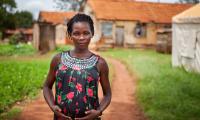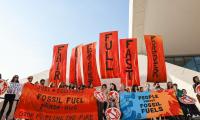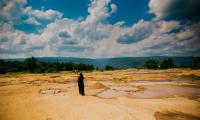Call to the global decision makers in Davos: Remember the world's most vulnerable in your climate discussions

By Mette Mølgaard, Sex & Samfund
When 3,000 politicians, business leaders, researchers and people from international organizations from all over the world are at the World Economic Forum in Davos this week to discuss the global challenges facing the world, they should also discuss how to solve the fact that some people are vulnerable to the effects of climate change due to their sexual and reproductive health status, and that climate change leads to violations of sexual and reproductive rights.
According to the 800 decision makers and professionals in "The Global Risks Report 2020", the top five threats to the global community right now are all about the climate and environment.
These threats worry the 800 respondents more than issues such as social unrest, new financial crises, refugee flows and terror.
Solutions to global challenges such as extreme weather events, failed climate policy, human-made environmental degradation, loss of biodiversity and ecosystem collapse are thus at the top of the agenda in Davos.
The young climate activists
While the global elite arrives to Davos in private jets and big cars, young climate activists have organized a 50 kilometer march from the Swiss city of Landquart to the global summit, to protest against the global leaders' failure to take responsibility and to find sustainable solutions to the climate crisis, and thereby giving the younger generations a future to look forward to.
They demand climate justice: "We carry the worldwide protest to where it belongs."
Although Sex & Samfund is not marching to Davos, we request of the global decision makers attending the World Economic Forum, who hold such great power over the future on behalf of the rest of us, that they recognize that climate change is also about climate justice, as it is the world's most vulnerable to climate change - those who have contributed the least to it - who are most affected by it.
The young activists are "privileged" to have the opportunity to march to Davos and demand of global decision makers and powerful stakeholders to take responsibility for the situation we are in. For the most vulnerable people in the world, this is not an opportunity.
Among them are the LGBT+ people and (pregnant) girls and women in the world's poorest countries, who due to their vulnerability are at a particular risk of suffering from the effects of climate change that we (the world's richest people and countries) have created.
LGBT+ people and (pregnant) girls and women are particularly vulnerable
Climate change is changing weather patterns, and we will continue to see colder winters and warmer summers. This challenges LGBT+ people, a stakeholder group who we rarely hear about in relation to climate change, but who are particularly vulnerable to homelessness, because of the discrimination and exclusion they encounter in society, making them particularly vulnerable to weather conditions.
Pregnant girls and women constitute another vulnerable group. When global warming leads to more frequent heat waves and increases their risk of 'overheating', this can lead to birth complications and at worst to maternal and child mortality. Flooding is also becoming more frequent, exposing pregnant girls and women (whose immune systems are usually already weaker than before the pregnancy) to infectious diseases such as cholera and diarrhea that can lead to dehydration - a life-threatening illness for both mother and child.
We also know that climate change is leading to (sexual and) gender based violence for girls, women and LGBT+ people living in temporary camps in the aftermath of a climate disaster, and for girls and women who have to walk long distances to fetch water and food in unknown territories, when a drought sets in. And we know that child marriages increase as desperate families, due to lack of income when a drought or flooding has destroyed a harvest, may find themselves forced to marry off their daughters to a man, who will be better able to take care of them. When a girl marries at an early age, the risk of early pregnancy increases, as do the health risks during pregnancy and childbirth.
With these people in mind, Sex & Samfund urges the global decision makers and power holders in Davos to consider climate justice in their discussions. Climate change is unfair. The solutions do not have to be.



